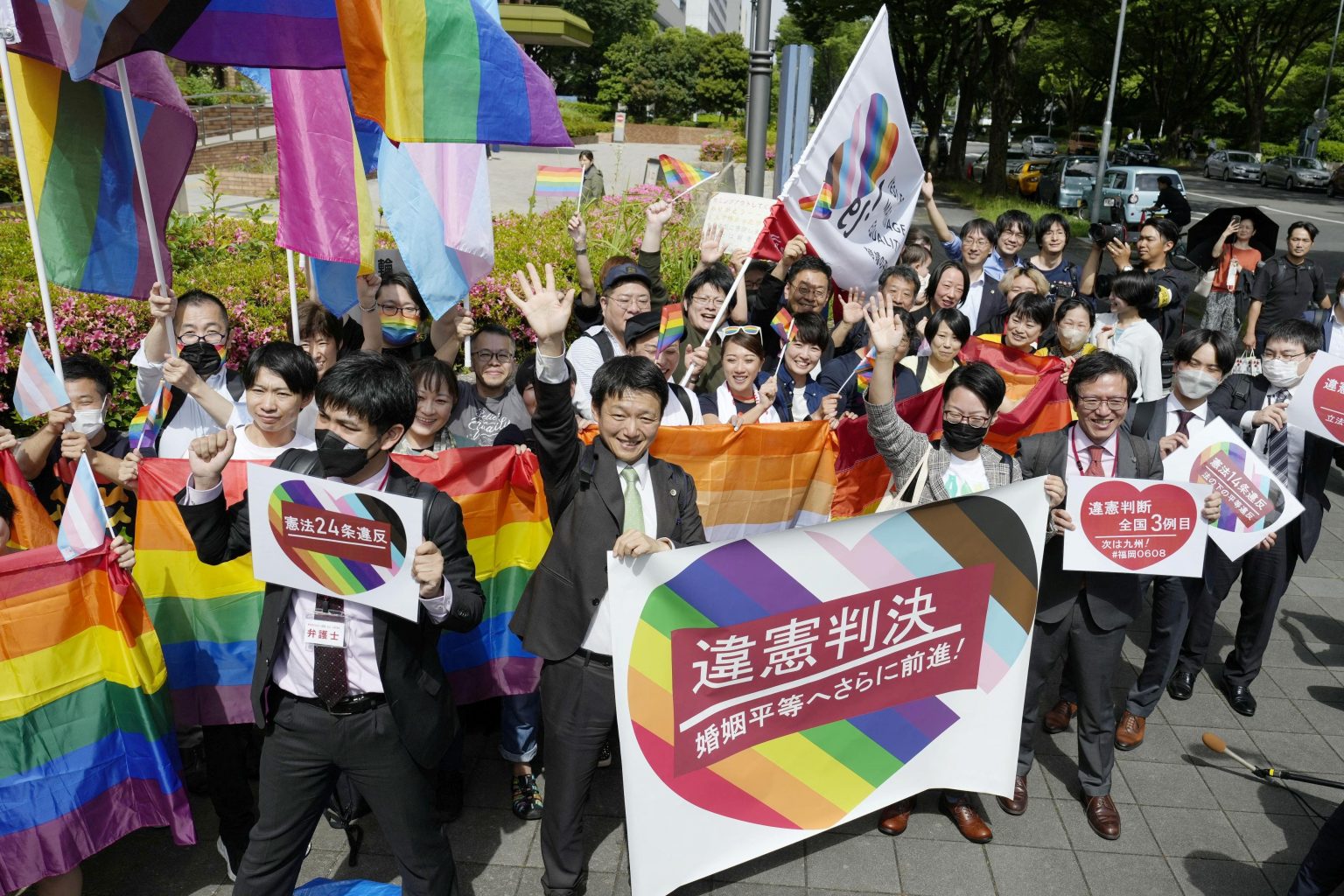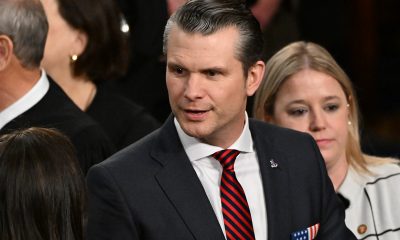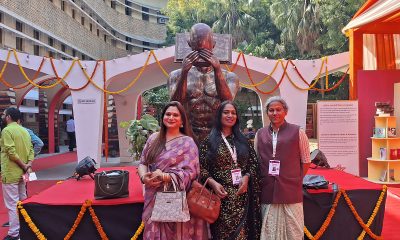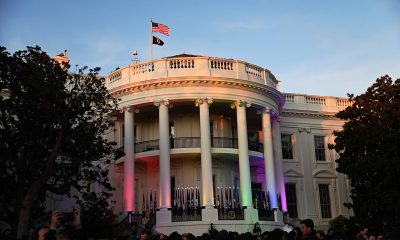Asia
Transgender influencers use platforms to promote acceptance in Asia
Indian model Sushant Divgikar has 1.8 million Instagram followers

In the time of the internet, new influencers are becoming famous every day. Some dance to someone’s else songs for viewership. Some talk about different gadgets, while others use the platform to create a powerful impact on society.
The transgender community in Asia continues to become more visible, but it still has a long way to go. Trans icons in the region who have become famous online are using their influence to spread awareness of the trans community among their fans and across their respective countries alike.
Kaede Sari, a Japanese architect, is fighting to spread awareness about trans people in her country and change society’s perspective of trans people as mere entertainment.
She released a documentary, “You Decide,” in July 2020 that is based on her life. The idea was to spread awareness about trans people in Japan and inspire other trans people in the country. The documentary was available in select theaters and on Netflix Japan.
“I have continued to disseminate information, especially to students and families, as well as corporate employers and personnel,” said Sari in a statement to the Washington Blade. “However, society is still in the process of change. Some transgender people may not be able to come out depending on their position. I want to tell them, ‘You don’t have to come out until the environment is ready. Until we change the whole society, please find a reliable person (to whom you) can come out. And please be a person that is trusted to receive the coming out of many people.'”
The trans community has been an integral and mostly accepted part of Japanese culture since the Edo period from 1603-1868.
Japan in the late 1800s moved from a country that accepted gender fluidity to one that adopted Western gender binary norms. The trans community in Japan now faces regular humiliation, misunderstanding and discrimination.
Japanese law stipulates a person has to show their ID — which often has a gender identity marker — when accessing education, health, transportation and other services. Authorities often ask invasive questions if a trans person’s picture doesn’t match their gender marker on the ID card.
Sari told the Blade she wanted to come out after finishing school, getting a job or moving into a new home.
She came out just before she began to look for employment. Sari said her trans friends either dropped out of school or decided not to come out.
“In Asia, many countries, including Japan, are conservative in change, and policies for LGBT (people) are spreading only in limited areas,” said Sari. “There are two steps to changing those who disagree with LGBT. ‘The stage of understanding LGBT’ and ‘the stage of accepting LGBT.’ I think we are in the stage of understanding now, so please get the correct knowledge.”
China, like Japan, has a long relationship with the trans community, but repression against it is a reality. Trans cultural icons in China are fighting hard to change the narrative and situation inside the country and abroad.
Fan Popo, a Chinese filmmaker and LGBTQ and intersex activist, is working to change attitudes about the country’s trans community through films and documentaries.
Popo is known for his iconic documentary “Mama Rainbow,” which has inspired many LGBTQ and intersex people in China. The film attracted significant viewers on the internet in China and started a public discussion about the queer community. It has since disappeared from Youku, Tudou, 56.com and other popular Chinese streaming services.
Popo launched a ferocious legal battle with China’s State Administration of Radio, Film and Television and the fight resulted in a partial victory in 2015.
He continues to make LGBTQ-focused films to spread awareness in China and among Chinese people who are living abroad.
Popo moved to Germany in 2017 and is now working on a fictional film debut. While talking with the Blade, he said the film is important for him as he feels he didn’t do enough for the queer community, and he wants to contribute more to the community in the coming years.
“Ever since I moved to Germany, I have been facing systematic racism. There are little resources are available for people of color,” said Popo. “What my colleagues in China have to face is also impacting me, so this makes me feel frustrated and unsafe. Another difficulty that I am facing right now is traveling back to China because of restrictions.”
Despite all the struggles, Popo has had a huge impact with his fans inside China and around the world.
His creativity and films historically have inspired the trans community. He has made six films, and his last film was “Beer! Beer!” in 2020.
In India, the trans community has historical ties to traditional Indian culture.
According to scholars and ancient Indian texts, the trans community garnered respect, but things changed once the British colonized the country.
Section 377 of India’s colonial-era penal code that came into force in 1861 criminalized homosexuality. The Indian Supreme Court in 2018 struck down the discriminatory law, but more than 200 years of British colonial rule pushed Indian society to become discriminatory against trans people.
To create awareness about trans Indians, trans icons are using their social media platforms and creating a positive impact on society.
Sushant Divgikar is an Indian model, actor, singer, drag queen and motivational speaker who won Mr. Gay India in 2014. With 1.8 million Instagram followers, Divgikar has been spreading awareness about the country’s trans community.
“The transgender community has shared a very beautiful status in the context of Indian cultural history in the pre-colonial area. After things changed because the British had very narrow-minded thoughts on the queer community. They talk about how the British divided and ruled the country based on caste, but they do not talk about how British rule divided the country based on gender diversity,” Divgikar told the Blade. “Over the past 16 and half years, I have been performing as a drag queen, actor, model, and motivational speaker, so of course, it has been a roller coaster ride, but I have never imagined this anything else. If I had not struggled this much, I would not have known what I have today and what I did not have.”
Divgikar since 2012 has appeared on many TV shows and participated in numerous competitions. They have also been using Instagram to talk about the queer community and start a public discussion. Divgikar has inspired many fans with their inspirational posts and stories.
Divgikar in 2020 appeared on Forbes 30 under 30 list.
“At the time when people were not ready to talk about their orientation, I was on TV, risking my life because I used to get death threats, I used to get rape threats. When I was younger, I used to get frustrated because of threats, but now I feel bad for them,” they said. “They are the ones who really need a big hug and some therapy. I don’t mind paying for their therapy.”
Divgikar also talked about their appearance on the third largest billboard in New York’s Times Square for an entire month.
While talking with the Blade, Divgikar said trans Indians feel represented when they see them on big stages. Divgikar feels pride in representing every Asian, and especially trans Indians, on the world stage.
“When you harm another person, you are not just harming that person,” said Divgikar while talking about hate crimes against the trans community in Asia. “You are killing the whole humanity.”
Ankush Kumar (Mohit) is a freelance reporter who has covered many stories for Washington and Los Angeles Blades from Iran, India and Singapore. He recently reported for the Daily Beast. He can be reached at [email protected]. He is on Twitter at @mohitkopinion.
Myanmar
LGBTQ advocacy group joins Myanmar earthquake relief effort
March 28 quake killed thousands, devastated country’s second-largest city

A powerful earthquake that rocked Myanmar on March 28 unleashed devastation across the central part of the country.
The U.S. Geological Survey measured the quake at 7.7, and pinpointing its epicenter roughly 10 miles west of Mandalay, the country’s second-largest city. A 6.4-magnitude aftershock jolted the area 12 minutes later, compounding the destruction and deepening the crisis for a nation already strained by conflict.
The earthquake struck with terrifying intensity near its epicenter, wreaking havoc on Mandalay and the nearby city of Sagaing.
Mandalay, a bustling city of approximately 1.5 million residents, bore the brunt of the destruction. Among the most striking losses was the 12-story Sky Villa Condominium, which collapsed, leaving scores trapped beneath the wreckage. Rescue workers scrambled to pull survivors from the rubble, but the rising death toll underscored the tragedy’s magnitude.
In Sagaing, which is located closer to the epicenter, more than 70 percent of buildings sustained damage. The Ava Bridge, an essential artery spanning the Irrawaddy River, collapsed, cutting off a critical connection to Mandalay. The earthquake’s shallow depth of less than seven miles amplified its power, reducing homes, temples, and schools to rubble.
The earthquake’s death toll continues to climb, with at least 3,649 confirmed dead, more than 5,000 injured, and approximately 145 people missing. Amid the widespread devastation, questions loom about the impact on vulnerable populations. The Washington Blade reached out to Colors Rainbow, an organization advocating for LGBTQ rights in Myanmar, to understand how the crisis has affected one of the nation’s most marginalized communities.
Colors Rainbow Executive Director Hla Myat Tun spoke about how his organization is working to address the crisis faced by Myanmar’s LGBTQ community in the aftermath of the earthquake.
Colors Rainbow has implemented a system of multipurpose cash transfers, directing funds to local LGBTQ partner organizations. These grassroots partners, in turn, provide essential support to affected individuals that includes emergency cash assistance, food, non-food items, clean water, and basic emotional support tailored to the immediate needs of their communities.
“We estimate that around 500–800 LGBTQ individuals have been impacted in the affected areas, particularly in Mandalay Region, Sagaing Region, and southern Shan state,” said Hla Myat Tun. “So far, we have been able to directly assist around 80–100 LGBTQ individuals.”
Hla Myat Tun told the Blade that Colors Rainbow is actively gathering data to assess the specific challenges that LGBTQ people are facing in the aftermath of the earthquake.
Preliminary observations, he noted, point to heightened vulnerability among LGBTQ people, driven by social exclusion and limited access to mainstream humanitarian aid. Hla Myat Tun, however, emphasized more comprehensive information is necessary to fully understand the scope of their needs and vulnerabilities in this crisis.
“We are partnering with international LGBTQ and feminist organizations that focus on displaced communities,” said Hla Myat Tun. “These partners provide emergency funds, and we coordinate with local LGBTQ groups to deliver aid directly to affected individuals on the ground.”
Addressing reports of military restrictions on humanitarian aid, Hla Myat Tun explained how Colors Rainbow is managing to reach LGBTQ people who are in conflict zones and areas the military junta controls. Hla Myat Tun highlighted the importance of the organization’s trusted local LGBTQ partners, who are embedded in these regions. Their presence and established networks, he said, are vital in navigating restricted areas and ensuring that aid reaches the LGBTQ people who are most in need.
Hla Myat Tun also provided insight into how Colors Rainbow is tailoring its relief efforts to meet the LGBTQ community’s specific needs.
He said his organization is gathering information directly from LGBTQ people through close coordination with its local partners, relying on both formal and informal communication channels. Hla Myat Tun told the Blade his team conducts daily check-ins via quick telephone calls, ensuring a continuous flow of information to guide their response efforts despite limited internet access, electricity and other challenges.
“Our approach is collaborative — we set strategies and share responsibilities to respond flexibly and safely, based on the rapidly changing local context,” he said. “Personal stories are being documented, but for security reasons, we are cautious about sharing them publicly.”
When asked whether staff or volunteers had harassment, discrimination, or violence while delivering aid — a concern given the precarious legal and social climate for LGBTQ people in Myanmar — Hla Myat Tun said there have been no reported incidents thus far.
“So far, we haven’t received any reports from our staff or local partners about harassment or violence while delivering aid,” he noted, emphasizing Colors Rainbow remains vigilant and has implemented robust safety protocols to protect all involved.
Colors Rainbow relies primarily on funding from international LGBTQ-focused partners. He noted, however, humanitarian funding specifically dedicated to LGBTQ communities remains vastly under-resourced, relative to the pressing needs on the ground. Hla Myat Tun said this shortfall severely limits the scale and reach of Colors Rainbow’s efforts.
“While Myanmar’s legal framework remains outdated, societal attitudes — especially during the civilian government — have shown signs of progress,” said Hla Myat Tun. “We have seen positive change thanks to the work of local LGBTQ organizations.”
“In the current crisis, many communities are working together despite legal barriers. However, in areas without LGBTQ-led organizations, inclusive humanitarian responses are still lacking,” he added. “There’s an urgent need for international humanitarian actors to understand and implement LGBTQ-inclusive practices in Myanmar.”
When asked about long-term strategies to support the recovery and resilience of LGBTQ communities as Myanmar rebuilds, Hla Myat Tun affirmed Colors Rainbow is deeply committed to fostering resilience. The organization’s initiatives include leadership development, community empowerment through training and workshops, sub-granting programs, and organizational development support. He also highlighted Colors Rainbow’s advocacy for LGBTQ-inclusive policies and collaboration with ethnic groups to promote an inclusive federal democracy, and specifically thanked Outright International, a global LGBTQ and intersex rights group, for “amplifying our work.
“This kind of international attention shines a spotlight on the challenges LGBTQ communities in Myanmar are facing and helps open doors for more support,” Hla Myat Tun told the Blade. “It also boosts visibility and solidarity, both locally and globally, which we deeply appreciate.”
India
LGBTQ poets included in India’s premier literary festival
Sahitya Akademi seen as mirror of government’s cultural agenda

India’s premier literary institution on March 7 announced it would allow LGBTQ poets to participate in its marquee Festival of Letters in New Delhi.
The Sahitya Akademi, often seen as a mirror of the government’s cultural agenda, for the first time allowed these poets into a high-profile poetry reading at the Rabindra Bhavan. They shared the stage with more than 700 writers across 50 languages.
Culture and Tourism Minister Gajendra Singh Shekhawat kicked off the Festival of Letters with Mahesh Dattani, the acclaimed English-language playwright famed for his provocative works, as the main guest. Dubbed Asia’s grandest literary gathering, the Sahitya Akademi took place over six days under the “Indian Literary Traditions” theme.
The 2025 Festival of Letters showcased a sweeping range of voices — young writers, women writers, Dalit authors from marginalized castes, Northeast Indian scribes, tribal poets, and LGBTQ poets — cementing its reputation as a literary kaleidoscope.
Kalki Subramaniam, a leading transgender rights activist and author, on March 9 chaired a literary session titled “Discussion on Literary Works of LGBTQ Writers in the 21st Century,” which spotlighted contemporary queer voices.
“It was enriching to listen to the profound thoughts of LGBT writers from various parts of the country in their speeches,” said Subramaniam. “The session was particularly memorable with the participation of A. Revathi Amma from Tamil Nadu, Reshma Prasad from Bihar, Sanjana Simon from New Delhi, and Devika Devendra Manglamukhi and Shivin from Uttar Pradesh and Aksaya K Rath from Orissa.”
Subramaniam discussed how global politics shape gender rights and the persistent erasure of trans identity, urging a unified push for solidarity within the LGBTQ community. She stressed the vital need to elevate queer works and writers, casting their voices as essential to the literary vanguard.
“It was a pleasure to meet great writers from around the country in the festival as well as meet my writer activist friends Sajana Simon and Revathi Amma after a long time,” said Subramaniam.

The government on March 12, 1954, formally established the Sahitya Akademi. A government resolution outlined its mission as a national entity tasked with advancing Indian literature and upholding rigorous literary standards; a mandate it has pursued for seven decades.
The Sahitya Akademi in 2018 broke ground in Kolkata, hosting the country’s first exclusive gathering of trans writers, a landmark nod to queer voices in Indian literature.
Hoshang Dinshaw Merchant, India’s pioneering openly gay poet and a leading voice in the nation’s gay liberation movement, on March 9 recited a poem at the Festival of Letters, his verses carrying the weight of his decades-long quest for queer recognition. He later thanked the session’s chair for welcoming the community, a gesture that underscored the event’s third day embrace of diverse voices.
The Sahitya Akademi in 2024 honored K. Vaishali with the Yuva Puraskar for her memoir “Homeless: Growing Up Lesbian and Dyslexic in India,” a raw account of navigating queerness and neurodivergence. Vaishali in a post-win interview reflected on India’s deep-seated conservatism around sexuality, noting she wrote from a place of relative safety — an upper-caste privilege that shielded her as she bared her truth. The award, she said, was the Akademi’s indelible seal on her lived experience, a validation no one could challenge.
The Sahitya Akademi’s inclusion of LGBTQ writers in its main program this year jars with the Bharatiya Janata Party-led government’s conservative stance, which, in 2023, opposed same-sex marriage in the Supreme Court, arguing it erodes Indian family values. Yet, under Shekhawat, the Sahitya Akademi’s spotlight on queer voices at the Rabindra Bhavan suggests it could be a tentative crack in a regime typically rooted in tradition.
The Festival of Letters hosted a translators’ meeting on March 10, spotlighting P. Vimala’s 2024 award-winning Tamil translation of Nalini Jameela’s “Autobiography of a Sex Worker,” a work steeped in marginalized voices that include queer perspectives.
This platform gained significant support from the BJP-led government, with Shekhawat securing a 15 percent budget increase to ₹47 crore ($5.63 million) in 2024. In Tamil Nadu state, however, Dravida Munnetra Kazhagam’s Chief Minister Muthuvel Karunanidhi Stalin, has long opposed such cross-linguistic efforts, fearing dilution of Tamil identity amid decades of anti-Hindi sentiment — a tension the Sahitya Akademi’s inclusive showcase sought to bypass.
‘The Akademi is very inclusive and has a friendly festival ambience,” Subramaniam told the Washington Blade.
Japan
Japan’s marriage equality movement gains steam
Nagoya High Court this month ruled lack of legal recognition is unconstitutional

Japan’s Nagoya High Court on March 7 ruled the lack of legal recognition of same-sex marriages violates the country’s constitution.
The plaintiffs argued Japan’s Civil Code and Family Registration Act, which does not recognize same-sex marriages, violates the country’s constitution. They cited Article 14, Paragraph 1, which guarantees equality under the law and prohibits discrimination based on factors that include race, creed, sex, or social status. The plaintiff also invoked Article 24, Paragraph 2, which emphasizes that laws governing marriage and family matters must uphold individual dignity and the fundamental equality of the sexes.
The plaintiffs sought damages of 1 million yen ($6,721.80) under Article 1, Paragraph 1, of the State Redress Act, which provides for compensation when a public official, through intentional or negligent acts in the course of their duties, causes harm to another individual. The claim centered on the government’s failure to enact necessary legislation, which prevented the plaintiff from marrying.
The court noted same-sex relationships have existed naturally long before the establishment of legal marriage. It emphasized that recognizing such relationships as legitimate is a fundamental legal interest connected to personal dignity, transcending the confines of traditional legal frameworks governing marriage and family.
The court further observed same-sex couples encounter significant disadvantages in various aspects of social life that cannot be addressed through civil partnership systems. These include housing challenges, such as restrictions on renting properties, and financial institutions refusing to recognize same-sex couples as family members for mortgages. Same-sex couples also face hurdles in accessing products and services tailored to family relationships. While the court deemed the relevant provisions unconstitutional, it clarified that the government’s failure to enact legislative changes does not constitute a violation under the State Redress Act.
The lawsuit, titled “Freedom of Marriage for All,” brought together a large coalition of professionals, including more than 30 plaintiffs and 80 lawyers. They filed six lawsuits in five courts throughout Japan.
“We filed these lawsuits on Valentine’s Day, Feb. 14, 2019, in Tokyo, Osaka, Nagoya, and Sapporo, and in September of that year in Fukuoka,” noted Takeharu Kato, director of Marriage for All Japan. “Then, in March 2021, the Sapporo District Court handed down the first ruling declaring the current laws unconstitutional, which received extensive worldwide media coverage. Subsequently, the Osaka District Court unfortunately ruled that the current law is constitutional, but among the 10 rulings handed down so far, nine have ruled that not recognizing marriage equality is unconstitutional.”
Kato is a lawyer who is part of the legal team in the Sapporo case. He is also a board member of Marriage for All Japan, a marriage equality campaign.
“The MFAJ (Marriage for All Japan) is fully supporting the lawsuits by publicizing the current status of the trials and the rulings in our websites and social networks, setting up press conferences at the time of the rulings,” Kato told the Washington Blade. “We also make the best of the impact of the lawsuits in our campaign by holding events with the plaintiffs of the lawsuits and inviting them to the rally at Diet (the Japanese parliament) members’ building.”
Kato said the campaign has significantly shifted public opinion, with recent polls indicating more than 70 percent of Japanese people now support marriage equality — up from approximately 40 percent before Marriage for All Japan launched. He also noted 49 percent of Diet members now back marriage equality.
Japan is the only G7 country that does not legally recognize same-sex couples. Taiwan, Nepal, and Thailand have extended full marriage rights to gays and lesbians.
Expressing disappointment, Kato said many Japanese politicians continue to resist marriage equality, despite overwhelming public support. Kato added Marriage for All Japan expects the Supreme Court to rule on their lawsuits in 2016.
“We believe that the Supreme Court will also rule that the current laws are unconstitutional,” he said. “However, the Supreme Court’s ruling alone is not enough to achieve marriage equality under the Japanese legal system. We should put more and more strong pressure on the Diet to legalize marriage equality in Japan as soon as possible.”
Several municipalities and prefectures issue certificates that provide limited benefits to same-sex couples, but they fall short of equal legal recognition.
Prime Minister Fumio Kishida’s government has faced mounting pressure on the issue as public support for marriage equality has surged in recent years. Kishida has yet to push reforms within his own party; encountering fierce opposition from its traditional leadership.
His government in June 2023 passed Japan’s first law addressing sexual orientation and gender identity, aiming to “promote understanding” and prevent “unfair discrimination.” Activists, however, widely criticized the legislation on grounds it fails to provide comprehensive protections or extend marriage rights to same-sex couples.
-

 U.S. Federal Courts4 days ago
U.S. Federal Courts4 days agoFederal judge blocks Trump passport executive order
-

 Obituary4 days ago
Obituary4 days agoLocal attorney, LGBTQ rights advocate Dale Sanders dies at 75
-

 Mexico4 days ago
Mexico4 days agoGay couple claims Puerto Vallarta wedding venue discriminated against them
-

 Books4 days ago
Books4 days ago‘Pronoun Trouble’ reminds us that punctuation matters












